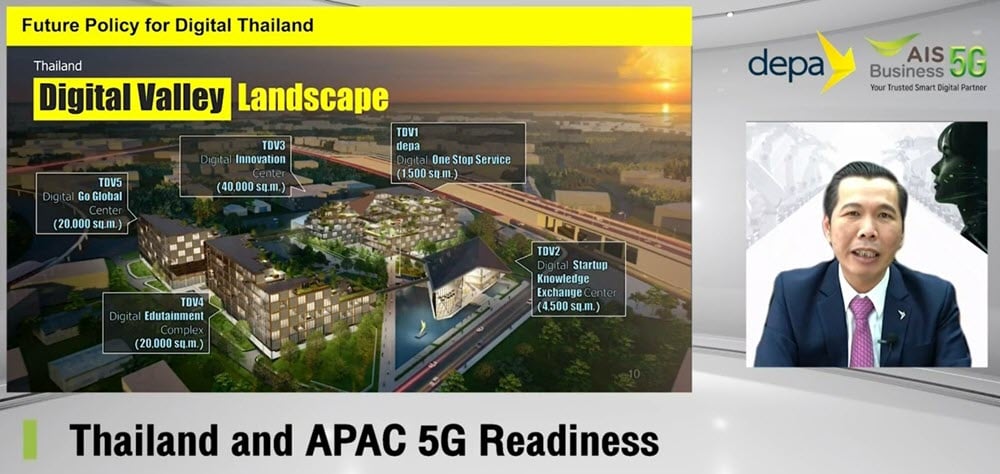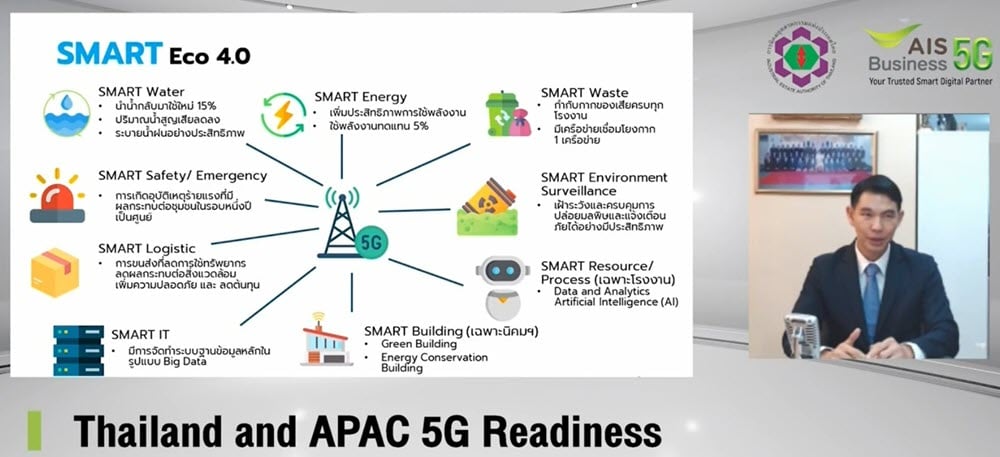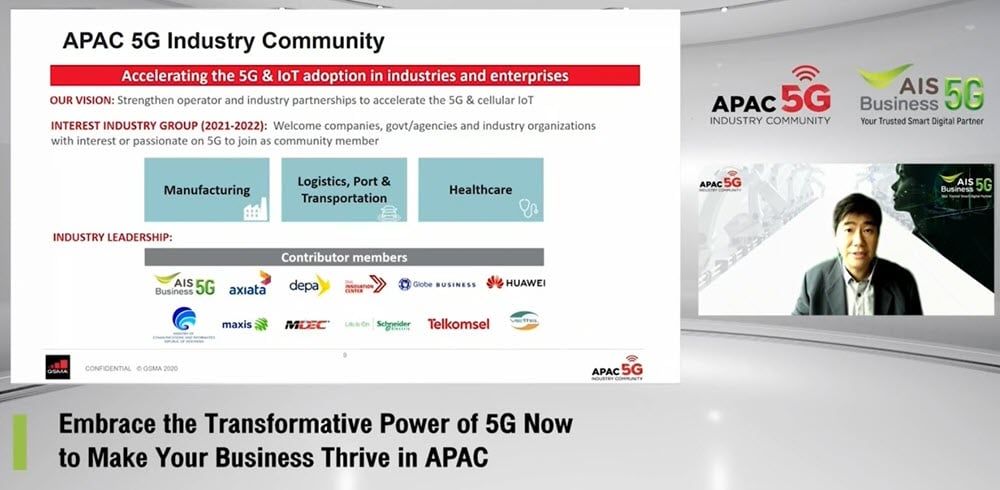
.jpg)
AIS 5G BUSINESS IS NOW: Testing the readiness of 5G in Thailand and the Asia Pacific
5G is starting to connect people and a large number of digital systems. Can you believe that in the near future 5G will be the infrastructure to spur innovations that will change our way of life, our way of doing business and work operations in various industries forever? At the seminar “AIS 5G Business is NOW” AIS Business shared views on how 5G can be deployed for business. Let’s take a look at how the 5G situation has progressed in Thailand’s industrial sector. We’ll also examine the readiness of the rest of the Asia Pacific and see how far 5G projects have progressed in the region, which is still the powerhouse of the global economy.
Mr. Navachai Kiartkorkuaa, Head of Enterprise Marketing and SME Business Management Section – AIS
“AIS is happy to announce that 5G is ready for use in Thailand and for industrial applications.”An announcement confidence by AIS, the number one high-speed Internet and mobile phone network provider in Thailand. Over the past several years, AIS has made great efforts to invest in necessary infrastructure for 5G services, such as bidding for the bandwidths, expanding coverage to reach every region, and developing platforms to support 5G connections. Nevertheless, all this could not have happened without the cooperation of many interested parties such as the industrial enterprises and innovation developers who put their trust in AIS. Let’s see the state of progress of AIS’s efforts to join forces with partners to build a 5G Ecosystem in Thailand.
AIS’s role in the Digital Valley project
The Digital Valley project is an initiative by the government to invest in a space for innovation development that will lead to valuable opportunities for Thailand’s digital economy. This policy is headed by the Digital Economy Promotion Agency (DEPA). The Digital Valley is a place that has all the facilities to promote the creation of a community of people and enterprises Thailand who share a common interest in technology. The Digital Valley comprises:

Asst. Prof. Dr.Nuttapon Nimmanphatcharin, President/CEO – DEPA
- TVD1 – Digital One Stop Service the place to contact for setting up a new business, because in the past setting up a new business was very difficult and involved a lot of paperwork. Entrepreneurs used to have to visit many different agencies. Now, at TDV1, they can see all the people they need to file applications all in one single place, including visa processing for foreign investors and foreign experts.
- TVD2 – Digital Startup Knowledge Exchange Center – this building has everything startups need to “Work, Learn and Live” including dining options, a fitness center and other facilities where people in the digital startup community can get together and exchange knowledge, spitball ideas, brainstorm innovations or discuss collaboration.
- TVD3 – Digital Innovation Center – facilities and space for experimenting and testing Deep Tech ideas in the fields of AI, EV, 5G, Cloud and IoT to see if they are really workable.
Thailand Digital Valley is a place where people interested in digital innovations from all over the world can gather and work. It makes it easier for startups to meet with investors as well as get exposed to advanced science and technology and the experts who designed them. The incentives for joining the Thailand Digital Valley are that it has the space for meeting and creating, space for testing and experimenting, and also everything you need to set up a company, arrange visas, and apply for tax privileges.
DEPA is aware of the changes happening in Thailand’s economic structure and the constant necessity of keeping up with the wave of technological changes. DEPA is determined to help Thai businesses understand and make use of Cloud infrastructure and the most up-to-date information. That is why DEPA joined AIS to establish a 5G innovation center where businesses can test out new solutions on 5G and prove that they will really work well when 5G is widespread.
In addition, AIS has also cooperated with the National Science and Technology Development Agency (NSTDA) in the Sustainable Manufacturing Center project at Wangchan Valley. This enables industrial enterprises to do tests on the Industrial IoT & Data Analytics Platform that is based on AIS’s 5G data transmission network. Surveys have shown that 5G is extremely important and can clearly show its full potential for many different applications in the industrial sector, including improving work systems and the manufacturing process, acting as a central clearinghouse for data processing, connecting people in different divisions, enhancing work safety, and managing energy use and environmental conservation. That is why the Eastern Economic Corridor or EEC is one of the first areas in which AIS set up and tested its 5G network to allow advanced uses by industrial factories.
AIS’s role implementing 5G in industrial estates
More than 65 industrial estates in 16 provinces of Thailand are administered by a state enterprise called the Industrial Estate Authority of Thailand (IEAT). The idea is that IEAT is in charge of monitoring all the factories in Thailand. IEAT’s current policy and approach is to create a society where factories and residents in surrounding areas can live together in a sustainable way. That means factories have to have good environmental management so they won’t cause a nuisance to the people living around them. The five fundamental principles for the IEAT are:
- Physical – have at least 10% green space within the industrial estate and maintain standard-quality waste water treatment systems
- Economic – create jobs in the community
- Environmental – reduce greenhouse gas emissions, reduce water pollution and air pollution and be more environmentally friendly with minimal costs
- Social – factory employees and people in the surrounding community have a good quality of life
- Management – members of the surrounding community can have a say in a factory’s administrative policies, and outsiders are allowed in to inspect the factory’s operations

Mr.Veeris Ammarapala, Governor – Industrial Estate Authority of Thailand
IEAT has set an even more far-reaching goal of bringing in technology for managing 8 functions in industrial estates, as shown in the graphic. All these technologies will be running on 5G infrastructure. For example, IoT will be used to measure water levels and monitor waste water, evaluate the quality of sunlight hitting solar cells, and inspect for deterioration or damage in the solar systems. And for other aspects besides management, IEAT believes in the future there will be virtual layout systems. In the past, when you wanted to find out where pipes were under the ground, you had to dig up and search for them, but in the future when the blueprints are recorded on a virtual system, you will know right away where they are. You could also make accurate measurements if you’re hoping to sell to foreign investors. Another application is the use of closed-circuit cameras and video analysis AI to keep track of the movements of trucks belonging to each factory so they can be more accurately charged for space use expenses.
In addition to cooperating with IEAT, at present AIS is coordinating with individual industrial estates such as Amata, WHA, Sahapat, Bangkadi, Rojana, Bangpoo Neua, HiTech, and Thai Bonnet Trading Zone to test and promote the use of many 5G applications. They are sure that in the near future AIS 5G will definitely play a role in promoting the management of these estates and we will see the full use of 5G for sure.
The role of AIS in the Asia Pacific
GSMA (the Global System for Mobile Communications Association) is an industry organization that represents the interests of mobile network operators worldwide and often holds seminars for the exchange of information, and organizes award competitions to inspire innovations that will be of benefit to end users. GSMA predicts that by the end of 2021, 5G will still only achieve 8% coverage but it will continue to grow, and by 2025, 5G will be the medium for 24% of all connections. That means that in the near future, 5G will lead to momentous business opportunities.
In the Asia Pacific, more than half of GSMA members are ready to provide 5G services, and Thailand is one of them. One thing to be proud of is that Thailand’s 5G is significantly faster than the 5G in most other Asian countries. At this time, the ASEAN region still has the highest growth rate in terms of number of Internet users, so it is predicted that in the next 10 years the value of the digital economy in the ASEAN region will grow to US$ 1 trillion. Besides all these business opportunities, 5G is also a key to supporting other technologies like IoT, Advanced Robotics, AI and AR/VR that will help raise the standard of industries.

Mr.Terence Wong, Head of APAC 5G Industry & IoT community – GSMA
GSMA believes that in 2021 and 2022, 3 major sectors will realize enormous benefits from 5G:
- Manufacturing – automation systems and IoT need to rely on 5G more and more, because 5G can support massive connectivity and has the right amount of latency to meet the needs of specific applications in real time. 5G can be applied to help raise the standard of industrial operations from upstream to downstream to consumers.
- Logistics – by 2023 smart transportation will play a bigger role, rising to a value of $24 billion. IoT will be at the heart of this kind of technology to make transportation smarter, including distribution of vaccines. When 5G is applied at seaports and airports there will be many more interesting use cases.
- Healthcare – 5G can enable more delicate treatment and health applications, and thanks to its low latency it can support long distance diagnostics and treatment, even including remote surgery.
AIS believes in the importance of network providers and other players in the region all growing together, so that countries in the Asia Pacific can benefit from examining and learning from each other’s case studies. AIS could model some of the success stories from neighboring countries, and Thailand could also be a model that could solve some of the problems faced by other countries. It will all fuel economic growth in the region. That is why AIS is a member of GSMA.
What’s more, AIS has a special collaboration with NTT Docomo, a service provider in Japan that is known for advanced network systems technology, to bring in know how for the benefit of Thailand. You could say, “5G is ready in Thailand and AIS is ready to promote the digital economy of Thailand and support Thai business.”
If you would like to know more details, please visit https://business.ais.co.th/5g/
Published 7 January 2022
AIS Business พร้อมเป็นพันธมิตรดิจิทัล ที่มั่นใจได้ เพื่อพัฒนาธุรกิจและสังคมไทย
เติบโต อุ่นใจ ไปด้วยกัน
"Your Trusted Smart Digital Partner"
ปรึกษาและวางแผนพัฒนาเทคโนโลยี เพื่อรองรับการทำงานและต่อยอดธุรกิจได้ที่
Email : business@ais.co.th
Website : https://www.ais.th/business
© 2026 Advanced Info Service PLC. All rights reserved.









